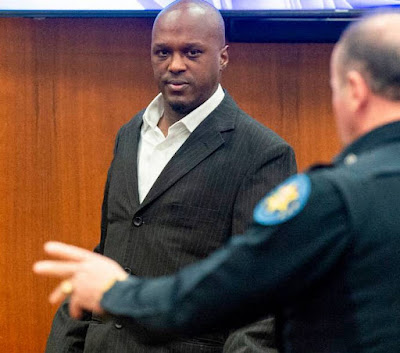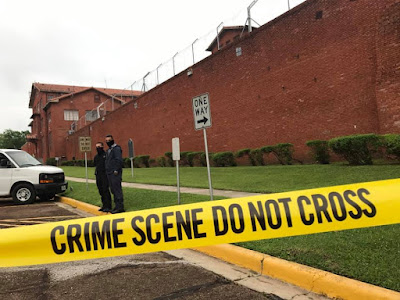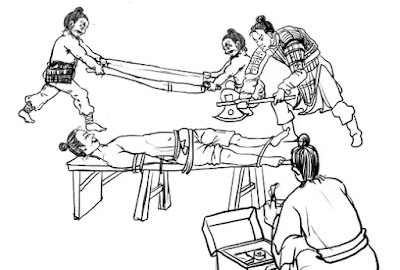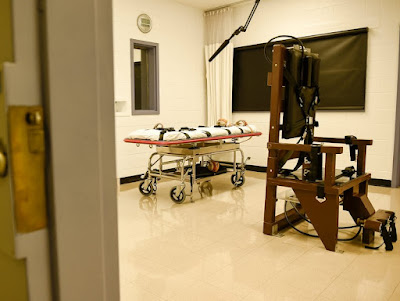 |
| Richard Glossip |
Oklahoma Gov. Mary Fallin does not have the power to commute the death sentence of Richard Glossip, her office said in response to criticism by activist actress Susan Sarandon.
Glossip is scheduled to die on Sept. 16 for hiring a man to murder his employer, Bary Allan Van Treese, in 1997. Glossip has always maintained his innocence.
Sarandon, who has campaigned against the death penalty for years, called Fallin a "horrible person" for refusing to intervene.
"Richard's case is so typical. Bad representation, 2 trials that were ridiculous, no physical evidence," Sarandon told the British news group Sky News on Thursday.
"He's put there by a snitch who actually did kill the person, and then the snitch has life and this guy is being put to death on the 16th. Once a mistake has been made within a judicial system, people just do not want to admit that mistake has been made and it becomes impossible to readdress them. And the only thing now that is going to give him a chance to survive is public opinion - is public embarrassment." Sarandon urged people to write Fallin to stop the execution.
She called the Glossip case "a perfect example of what's wrong with the death penalty, and so of course I'm hoping that some kind of exposure will give him the opportunity to maybe get his sentence at least commuted, because he's clearly innocent, and on top of that the guy who actually killed the person is in a minimum security prison for the rest of his life."
Fallin's spokesman Alex Weintz responded to Sarandon and several media inquiries on Twitter, saying Fallin does not have the ability to grant Glossip clemency.
"The limit of her legal ability to intervene is to grant a 60 day stay," Weintz tweeted Thursday. "The gov[ernor] can only grant clemency [to] inmates who have been recommended clemency by the Pardon and Parole Board. Glossip's request was unanimously denied ... To say Glossip has had his day in court is an understatement. He has been pursuing the same arguments publicly and in court for 20 years. He was convicted of murder in court twice and sentenced to death twice by 2 juries (24 total jurors unanimous in their verdict)."
Even if Fallin could grant clemency, doing so would "unilaterally overturn" the judgments of jurors and several courts, including the 10th Circuit and U.S. Supreme Court, Weintz said.
"Glossip's execution is going forward because he is (a) guilty and (b) has exhausted his legal options," he said. "Final thought: there are multiple victims here, none of them Glossip. A man beaten to death, wife without a husband, 5 kids with no dad."
 |
| Susan Sarandon |
Sarandon won an Academy Award for Best Actress in 1995 for her portrayal of anti-death penalty activist Sister Helen Prejean in "Dead Man Walking." Prejean also has called for Glossip's exoneration.
Glossip and 3 other death row inmates sued Oklahoma last year, claiming its use of midazolam - the 1st drug in a new 3-drug replacement protocol - fails to render a person insensate to pain, in violation of the Eighth Amendment.
States have been forced to seek replacement execution drugs from compounding pharmacies after anti-death penalty opponents persuaded large drug manufacturers to stop making lethal injection drugs. Oklahoma's previous protocol required pentobarbital to knock the inmate unconscious, vecuronium to stop breathing and potassium chloride to stop the heart.
Glossip's lawsuit was filed after the botched execution of murderer Clayton Lockett, 38, in April 2014. He was declared unconscious after being injected with midazolam, but breathed heavily, writhed, clenched his teeth and strained to lift his head off a pillow 3 minutes later. Blinds separating a viewing gallery and the death chamber were lowered and Oklahoma Department of Corrections Director Robert Patton ordered the execution stopped. It took Lockett 43 minutes to die of a heart attack.
In a 5-4 ruling on June 29, the U.S. Supreme Court upheld the new execution protocol. Oklahoma quickly rescheduled four executions. The Supreme Court said the inmates failed "to identify a known and available alternative method of execution that entails a lesser risk of pain."
Source: Courthouse News, August 8, 2015




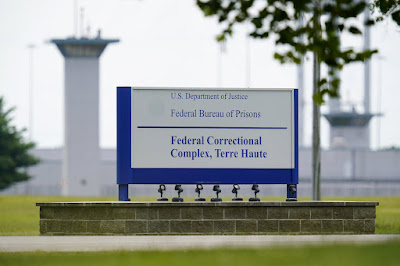
.jpg)
